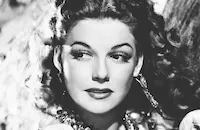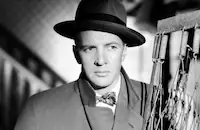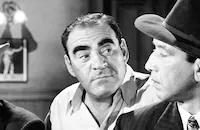Nora Prentiss

Brief Synopsis
Cast & Crew
Vincent Sherman
Ann Sheridan
Kent Smith
Bruce Bennett
Robert Alda
Rosemary Decamp
Film Details
Technical Specs

Synopsis
A man, who is thought to have murdered the well-respected Dr. Richard Talbot, is returned to San Francisco under guard. Despite intense questioning by the police, however, the man will not reveal why he committed the crime. Later, the man reflects on the incidents that led to this moment: Stuffy, middle-aged Talbot is married to Lucy, a doctor's daughter, who believes in self-discipline and scheduling. Carried away by a beautiful spring day, Talbot suggests that they go to the mountains over the weekend, but Lucy reminds him that she is taking their children, Bonita and Gregory, to her mother's. At the office, in the absence of his partner, Dr. Joel Merriman, Talbot examines Merriman's patient, Walter Bailey. When Merriman finally arrives at the office, Talbot sternly warns him that he must be available for his patients in case of emergencies, but Merriman responds that leading a life like Talbot's would be too dull for him. Much later, as Talbot prepares to leave for the evening, a woman is hit by a car. When Talbot examines her, she tells him that she is a nightclub singer named Nora Prentiss. She flirts a little with him, and concerned about possible injuries, he walks her home. When Talbot again asks Lucy to remain home with him, she accuses him of being childish. That weekend, Talbot goes to the club at which Nora sings. Nora is surprised to see him and makes it clear that she is not interested in having an affair, but he explains that he only wants to be friends. The next day, however, Talbot invites Nora for a drive to his mountain cabin, and they begin an affair, despite her misgivings. Soon, his family starts to worry about his unpredictable behavior. He almost misses Bonita's sixteenth birthday party and neglects his patients. Realizing the harm their affair is causing to Talbot's life, Nora suggests that they end it. Talbot insists that he will get a divorce and go away with her, but is unable to tell his wife. After Talbot bungles an operation, Nora announces that she is leaving him for his own good. In desperation, Talbot starts to write to Lucy, but while he struggles with the letter, Bailey arrives in need of medical attention. Before Talbot can give him an injection, Bailey collapses and dies from a heart attack. Talbot then decides to make it look as if he, rather than Bailey had died. He places Bailey's body in his car and pushes it off a cliff. He then meets Nora and leaves town with her. Later, Lucy asks Merriman why Talbot was withdrawing large sums of money from the bank. Merriman searches Talbot's office and finds part of the letter he was writing to Lucy. Mistakenly believing that Talbot was being blackmailed, Merriman tells the police that he suspects Talbot was murdered. In New York City, Talbot learns that his "death" is being investigated. Nora, who does not know what Talbot did, cannot understand why he refuses to be seen in public. Angry because they still have to sneak around, she provokes a quarrel and Talbot agrees to take her to a nightclub run by Phil Dinardo, her former boss. There, however, Talbot sees someone that he knows and hustles Nora out of the club. After Nora forces Talbot to tell her the truth, she promises not to leave him and gets a job singing again for Dinardo. Talbot starts to drink and becomes jealous of Dinardo. When Talbot walks in on Dinardo proposing to Nora, he starts a fight. Later, Talbot crashes a stolen car during a police chase and is badly burned. Although he recovers, his face is changed. Ironically, Talbot is now arrested for his own murder. During the trial, Talbot refuses to defend himself, because he does not want to shame his family, and is found guilty. Nora begs him to reveal the truth, but he refuses and makes her promise never to tell anyone. The loyal Dinardo is waiting when Nora leaves the jail.

Director

Vincent Sherman
Cast

Ann Sheridan

Kent Smith

Bruce Bennett

Robert Alda

Rosemary Decamp

John Ridgely

Robert Arthur
Wanda Hendrix
Helen Brown
Rory Mallinson
Harry Shannon

James Flavin

Douglas Kennedy

Don Mcguire
Clifton Young

Jack Mower
John Newland
John Compton
Ramon Ros
Herb Caen

Bill Macwilliams
Mike Musura
Jerry Bauluch
Fred Johnson
Jack Daley
Bill Best
Seymore Snaer
James Nickle
Philo Mccullough
Fred Kelsey
Louis Quince
Lottie Williams
Gertrude Carr
Richard Walsh
Tiny Jones
Georgia Caine
Dean Cameron

Roy Gordon
David Fresco
Jack Ellis

Lee Phelps
Creighton Hale
Ed Hart
Clancy Cooper
Alan Bridge
Ross Ford
Adele St. Maur

Ralph Dunn
Ed Chandler
Charles Marsh
Matt Mchugh
Wallace Scott
Charles Jordan
John Elliott
George Campeau
Crew
Harry Barndollar
Eddie Cherkose
Edwin Du Par
Leo F. Forbstein
Anton Grot
James Wong Howe
William Jacobs
M. K. Jerome
Charles Lang
James Leicester
Philip Macdonald
Owen Marks
James Mcmahon
N. Richard Nash
Leonid Raab
Jack Scholl
Jack Sobell
Walter Tilford
Travilla
Jack L. Warner
Franz Waxman
Paul Webster
Perc Westmore

Photo Collections
Videos
Movie Clip



Trailer
Film Details
Technical Specs

Articles
Nora Prentiss
Ad line for Nora Prentiss
Warner Bros.' advertising placed this 1947 thriller squarely within the film noir genre, with its tale of a doctor (Kent Smith) whose obsession with nightclub singer Ann Sheridan destroys his life. What the ads failed to note was that with Sheridan in the title role, Nora Prentiss was just about the nicest femme fatale in film history. Then again, that's what audiences expected when they went to Sheridan's films, and it helped make Nora Prentiss another hit for her.
She certainly needed it. When she went to work on Nora Prentiss, she had been off the screen for eighteen months, battling Warner Bros. for better scripts and more money. She turned down everything sent to her, including Mildred Pierce (1945), which went on to win Joan Crawford an Oscar. When she and the studio finally hammered out a new contract, Warners rewarded her with this showcase for her unique combination of warmth and sex appeal - 'what the publicity department called "Oomph."
Part of the reward was a chance to work with Vincent Sherman, who had established himself as one of the studio's best directors of women. Previously, he had drawn strong performances from Ida Lupino in The Hard Way (1942) and Bette Davis in Old Acquaintance (1943) and Mr. Skeffington (1944), and he would work the same magic with Sheridan.
Helping him a lot was cinematographer James Wong Howe. The Chinese-born Howe had been nicknamed Low Key Hoe because of his fondness for dark, shadowy scenes. Howe and Sherman set Nora Prentiss in a nightmare world that mirrored the male lead's paranoia. Their use of subjective shots, disorienting angles and deep shadows helped make the picture a memorable film noir.
Director: Vincent Sherman
Producer: William Jacobs, Jack L. Warner
Screenplay: N. Richard Nash
Cinematography: James Wong Howe
Editor: Owen Marks
Art Direction: Anton Grot
Music: Franz Waxman
Cast: Ann Sheridan (Nora Prentiss), Kent Smith (Dr. Richard Talbot), Bruce Bennett (Dr. Joel Merriam), Robert Alda (Phil McDade), Rosemary De Camp (Lucy Talbot).
BW-112m. Close captioning.
by Frank Miller

Nora Prentiss
Quotes
Trivia
Notes
This film's working title was The Sentence. According to a February 27, 1946 press release, cast members Herb Caen, Bill McWilliams, Mike Musura, Jerry Bauluch, Fred Johnson, Jack Daley, Bill Best, Seymore Snaer and James Nickle were real-life reporters. Caen became a noted San Francisco columnist, whose column was published for more than fifty years. According to the Variety review, the story was based on "an actual insurance case history."















